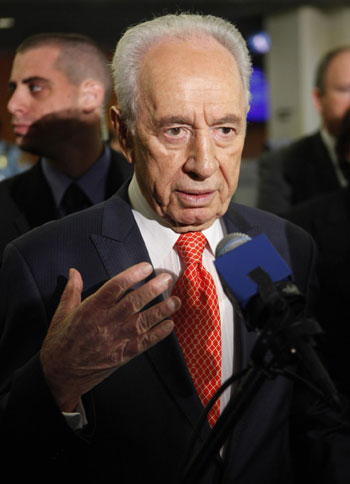Photo
Peres resists Gul's call for an apology on raid
(Agencies)
Updated: 2010-09-21 13:28
 |
Large Medium Small |
UNITED NATIONS - Israeli President Shimon Peres said Monday that a planned meeting with his Turkish counterpart was scrapped because of Peres' refusal to apologize for the deadly commando raid on a Turkish-led flotilla that tried to breach Israel's blockade of the Gaza Strip.
|
 Israel's President Shimon Peres answers a few questions from journalists during the Millennium Development Goals Summit at UN headquarters, in New York September 20, 2010. [Photo/Agencies] |
In the latest bid to repair Israel's relations with its only Muslim ally in the region, Peres told reporters he had agreed to join Turkish President Abdullah Gul at the Clinton Global Initiative in New York, then accepted Gul's invitation to meet on the sidelines.
Relations between the two countries have been deteriorating and hit a low point after the May raid in which nine people, including eight Turks and a Turkish-American, were killed.
But Peres said that Gul demanded Israel publicly apologize for the May raid, and he refused. Gul had blamed the canceled meeting on a scheduling problem.
"I got some conditions which made this meeting in my judgment not a positive one," Peres told reporters as the U.N. General Assembly's Millennium Development Goals summit was getting under way.
"Now we didn't change our attitude to Turkey. We were friends, we remain friends. Maybe Turkey changed her mind, and that's for the Turks to decide," Peres said. "We don't intend to worsen the situation. Neither can we submit to preconditions which are totally unacceptable."
Gul had cited a scheduling problem and said there would be no meeting with Peres in comments late Sunday that were carried by Turkey's state-run news agency, Anatolia. Some reports had suggested that the two men would meet in a sign of an improvement in strained relations between the two formerly close allies.
Turkey is demanding an apology for the raid and compensation for the victims' families.
Investigators from a U.N. human rights inquiry on the May 31 flotilla attack have been interviewing witnesses, including an Israeli Knesset member. Israel refused to cooperate with that probe and accused the U.N. Human Rights Council of bias.
But it is cooperating with a separate U.N. panel ordered by Secretary-General Ban Ki-moon. That panel, led by New Zealand's ex-Prime Minister Geoffrey Palmer and Colombia's ex-President Alvaro Uribe, is looking into legal issues "Osurrounding the incident.
Israeli commandos opened fire after meeting what they called unexpected resistance when they tried to prevent a Turkish aid ship from breaking Israel's blockade of Gaza. Both countries said they acted in self-defense.
An international outcry resulted, forcing Israel to ease its blockade of Hamas-ruled Gaza. Israel and Egypt imposed the blockade in June 2007 after Hamas militants took control of the area.
Israel's military completed its own investigation, which found that its intelligence failed to predict the violent response but its troops reacted properly.
Later Monday, Peres met privately with Palestinian President Mahmoud Abbas. In a brief appearance afterward, neither leader would discuss particulars about the talks. The key issue of whether Israel will extend a partial ban on settlement building in the West Bank, territory the Palestinians want for a future state, was not addressed by either man.
On Tuesday, Peres also will appear at a roundtable discussion the Clinton Global Initiative with Palestinian Prime Minister Salam Fayyad and Bahrain's crown prince, Sheik Salman bin Hamad Al Khalifa. Bahrain and Israel have no formal relations. Former President Bill Clinton will moderate.